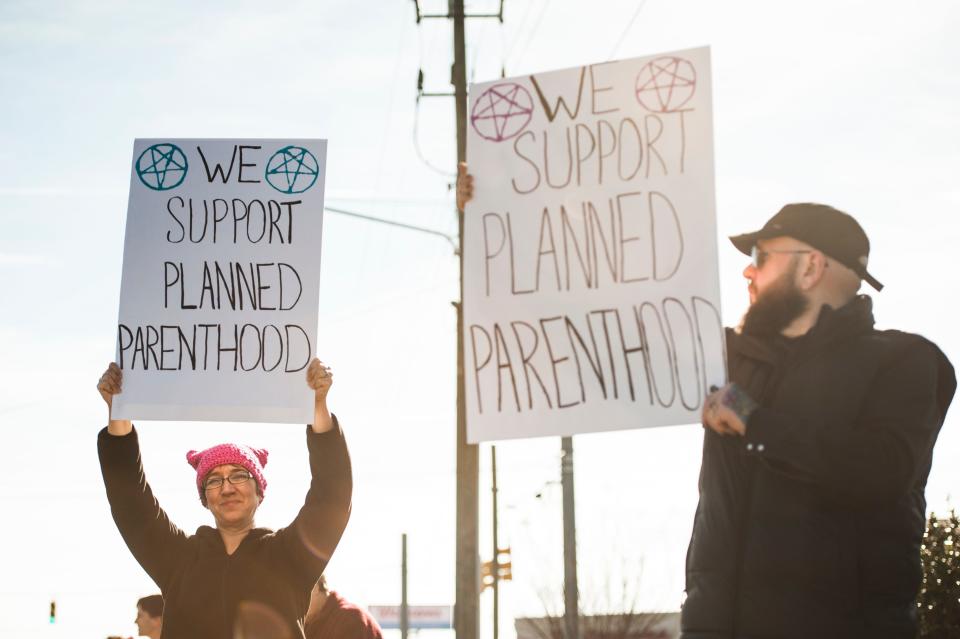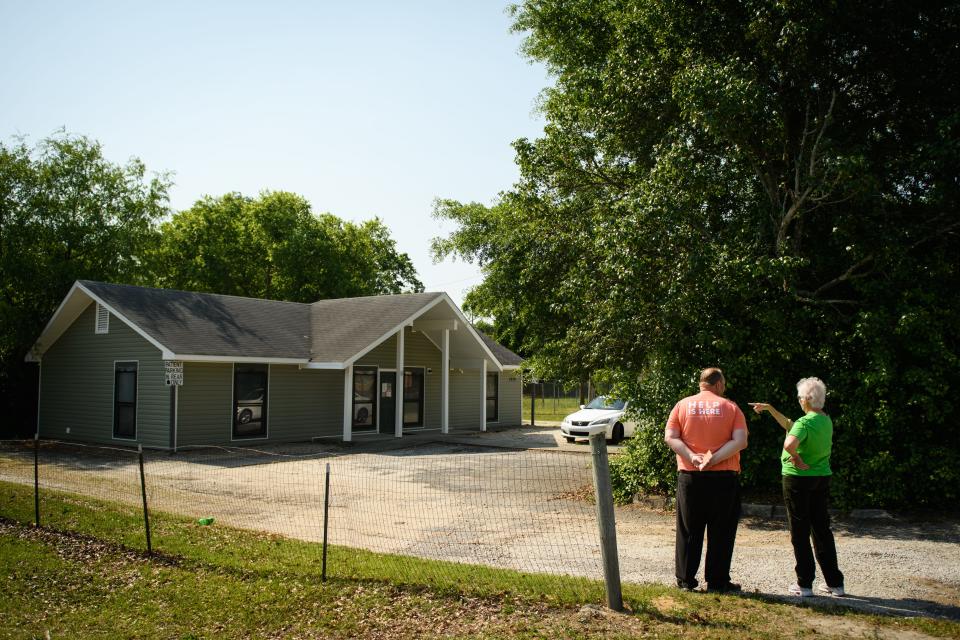'It's not fair': Fayetteville residents react to possible overturning of Roe v. Wade
- Oops!Something went wrong.Please try again later.
After the leak of a draft opinion from the U.S. Supreme Court suggesting the court may overturn Roe v. Wade, a landmark decision that protects abortion access, many Americans fear the end of abortion rights.
According to the draft written by Associate Justice Samuel Alito, the Supreme Court had voted to strike down the 1973 decision and return the abortion rights issue to the states.
For almost half a century, there has been fierce debate on both sides of the abortion argument and since the appointment of three conservative justices to the Supreme Court during former President Donald Trump's tenure, speculation about the possible end of Roe v. Wade has only grown.
In Fayetteville, many pro-choice advocates have worked to protect reproductive rights for residents and the news of the possible reversal of longstanding legal precedent angered many and was heralded by others.
Related reporting: Would overturn of Roe v. Wade end abortion in North Carolina? How soon?
While North Carolina's Democratic leaders have worked to ensure protections for abortions, many in Fayetteville still question what might happen in the state if abortion rights are repealed.
'Outlawing abortions will not stop them'

The draft, written by Alito in February, was first published Monday by POLITICO, a Northern Virginia-based news organization.
Chief Justice John Roberts confirmed Tuesday that the draft was authentic and called for an investigation into the leak. The court's findings are not final until published, and experts predict this will happen in the next few months.
Roberta Waddle of Fayetteville said that when the news broke about the leak, she first thought about the diverse groups of people who will be affected by the rollback of protection of women's reproductive rights.
"I'm very concerned. We are going backwards so fast that it's like whiplash," Waddle said. "Some of us have been working for expanded abortion rights for many years. Some of us are right tired of this. Outlawing abortions will not stop them."
Waddle has been an advocate for abortion and reproductive rights for years. She said she is worried that the decision to overturn Roe v. Wade poses a threat to other forms of reproductive health like access to birth control. Waddle said the decision also makes her concerned about the rights and liberties extended to LGBTQ+ communities and other minorities.
Diane Parfitt, the former Democratic state House representative for District 44, which covers Cumberland County, echoed Waddle's thoughts. Like others, Parfitt said she is hoping the draft decision doesn't become reality.
"I think we've all been getting a feeling that the handwriting's on the wall that this is what's going to happen," Parfitt said. "It's just too bad. (Abortion) has become totally political and it's gotten away from the important thing which is a woman's right to choose."
Parfitt said she had a feeling that abortion access would be more difficult in North Carolina if more Republican lawmakers are elected in this year's election. She disagrees with the government's interference in a person's right of choice.
Since elected, Democratic Gov. Roy Cooper has used his veto power on a number of strict abortion laws pushed by Republican lawmakers.
Republicans need three seats in the state House of Representatives and two seats in the state Senate to have enough votes to override Cooper's vetoes.
What would the end of Roe v. Wade mean for abortion in NC? 6 things you need to know
Pamela Carver, president of the Fayetteville chapter of the National Organization for Women, said the decision to overturn abortion protections is an attack on the right to privacy.
"While this was a gut punch, it is something that we have been aware that people have been trying to do ever since Roe passed," Carver said. "Anti-abortionists have played the long game of pushing legislators and judges that support undoing Roe v. Wade ... Roe is just the first."
Carver said Roe v. Wade has been resting on the judgment of the Supreme Court for too long and needs to be made into actual law by Congress.
"It's been reaffirmed and reaffirmed and reaffirmed, and it's been disappointing because when you look at these justices, you wonder, did they perjure themselves before the Senate hearings when they said they recognized Roe as established law and now they want to vote to gut it?" Carver said.
'Voice to the voiceless'

Tim Baugus, senior pastor of Cumberland Baptist Church on Cumberland Road, said he speaks out against abortion in order to be a "voice to the voiceless."
Baugus has been participating in anti-abortion rallies at Planned Parenthood on Yadkin Road in Fayetteville. Members of his church often gather there on weekends.
"We are not down there protesting, we're not down there sharing hate, we're down there sharing love," Baugus said. "We want the mothers to know that we are praying for them."
He said that in partnership with the Charlotte-based Love Life organization, his church has offered to help expectant mothers with baby showers and financial needs. They also offer to help women with the adoption process.
For Baugus and members of his congregation, life begins at conception and fetuses are babies, not a "clump of cells."
"We want these mothers to understand that they have a living human being inside of them," he said.
Baugus said church members who gather outside the clinic aren't seeking to judge women but to provide information. He said the employees of the facility are not immune to this advice, even they are offered help to find new employment.
"We're shedding light onto the darkness that maybe these clinics are not being honest with these mothers," Baugus said. He supports the Supreme Court overturning Roe v. Wade and is thankful to see the possibility.
'This is supposed to be a democracy'
Jamilyn Wallace, 19, said she spent all Tuesday night talking with her friends about the possible overturn of Roe v. Wade.
As a sophomore at Fayetteville State University, she said many of her classmates are angry and shocked. They don't understand why so many political leaders and other people are invested in what a woman does with her body. Wallace said it is "sickening" to think about the possibility of not having abortion protections.
"At first, I was shocked and confused," Wallace said. "I didn't understand why they felt the need to change such a big law. It's not fair to a lot of young women of all backgrounds."
Wallace said she is hoping the justices and lawmakers listen to the majority of people outspoken against the decision to overturn Roe. She doesn't believe leaders have considered the real-life implications for those choosing abortions.
"This is supposed to be a democracy," Wallace said. "There are a lot of people that are not equipped to be parents and they know that and if they're trying to take precautions to keep another child from going into the system or going on the streets ... (protections) would help."
In college, during a time when many young people are exploring sexual freedoms, Wallace said some people have expressed experiencing "pregnancy scares" and use birth control and other contraception to have control of their futures.
"If we're not ready to bring a child into the world, we shouldn't have to," Wallace said. "For people who don't even know us, don't talk to us, or know what our daily lives are, to have a say is not right."
Fellow FSU student Rachel Ruff, 20, director of diversity and inclusion for the Student Government Association, said she doesn't have too many feelings about Roe v. Wade but for the right to abortion to be taken away is sad.
"I'm (registered) independent, but it's just sad to see the commentary on both sides and the personal attacks and the politicians leading discussions about real people," Ruff said. "We are trying to get to a more civically engaged society, but we kind of see that crumbling ... this is a jumble of emotions."
Ruff said she wants to see more elected officials who are community politicians. She said there has been a lack of LGBTQ people in leadership and wants a more intersectional approach to feminist efforts.
Ruff, a senior political science major, also said she doesn't agree with the leaked draft opinion, saying it undermines the American political process.
"The best thing politicians can do is look at (the draft) and look at how it applies to the average citizen," Ruff said. "What works for the American people and what will work?"
Protecting the right to choose
Jenny Black, president of Planned Parenthood South Atlantic, where Baugus and others gather, said abortion decisions should not be the business of politicians or others to make.
"No one's personal feelings about abortion should decide for all of us," Black said. "Sometimes the decision to have an abortion is simple and straightforward and sometimes it's very complicated. Either way, it should be up to you."
More than half of patients who visit Planned Parenthood seeking an abortion are already parents, she said. Because of this, they understand the rights and responsibilities of parenthood.
"We trust them to make decisions that are best for them," Black said. "They're the experts of their own lives."
Protecting reproductive rights and abortion has been part of Black's life work. Like others, she knew the decision was coming but says it has been sobering to see it happen.
"We understand that abortion bans are most harshly felt by Black and brown patients. We understand that abortion bans are rooted in white supremacy and we're really concerned about the anti-abortion rights groups unveiling their ultimate plan to outright ban abortion nationwide," she said. "This is a devastating step that SCOTUS has taken, this isn't even the end game."
Black said people don't have to imagine what would happen next if Roe v. Wade is overturned. Protections for LGBTQ people, interracial marriage, same-sex marriage and access to contraception also hang in the balance.
With the midterm elections coming up, Black and other advocates for abortion rights are hoping to see the leaked Supreme Court draft galvanize people to the polls once again to elect leaders who will work to protect rights and healthcare.
"We're part of an important health care ecosystem that's already constrained and when you layer this level of restrictions and bans and shame and stigma on top of that you're only going to find the system constrained to the point of breaking," Black said.
Investigative Reporter Kristen Johnson can be reached at kjohnson1@gannett.com.
This article originally appeared on The Fayetteville Observer: Fayetteville reactions to Supreme Court's Roe v. Wade leak
